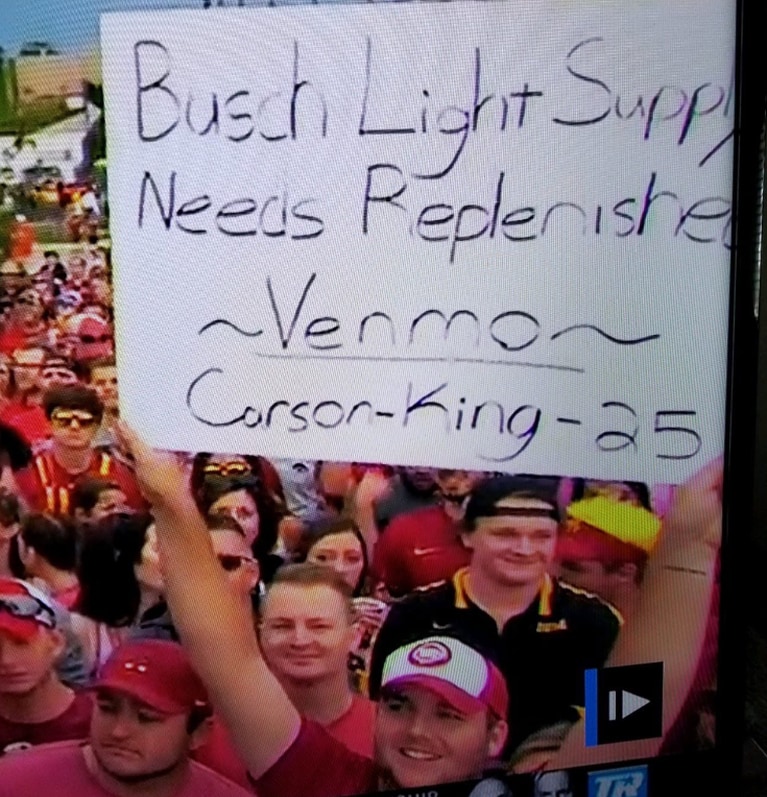Ad Disclosure
Iowa Newspaper Reporter Digs Up Old Racist Tweets from Guy Who Raised $1 Million for Children’s Hospital

If you watched College Gameday two weekends ago, maybe you saw 24 year old Carson King holding up a sign that said “Busch Light Supply Needs Replenished,” which included his Venmo username.
That brief moment on television resulted in a ton of money hitting his account, and instead of keeping it King decided to donate it to the Stead Family Children’s Hospital on the University of Iowa campus. Anheuser-Busch, which owns Busch Light, said it would match King’s donation and give him free beer for an entire year.
So fast forward to this week, when a reporter at the Des Moines Register unearthed racist social media posts that King made eight years ago, when he was 16. Here’s how the people who run the newspaper explained the editorial process, in part:
On Monday evening, Register reporter Aaron Calvin was assigned to interview King for a profile. On Tuesday, as he worked to write the story, he did a routine background check on King that included a review of publicly visible social media posts, a standard part of a reporter’s work on a profile. Calvin found two racist jokes that King had posted on Twitter in 2012. Calvin asked King about them, and he expressed deep regret.
That prompted a discussion involving several Register editors about how best to proceed: Should that material be included in the profile at all? The jokes were highly inappropriate and were public posts. Shouldn’t that be acknowledged to all the people who had donated money to King’s cause or were planning to do so?
The counter arguments: The tweets were posted seven years ago, when King was 16. And he was remorseful. Should we chalk up the posts to a youthful mistake and omit the information?
Eventually, Register editors decided we would include the information, but at the bottom of the story. We thought we should be transparent about what we had found, but not highlight it at the top of the story or as a separate story. It was planned as a few paragraphs toward the bottom of the profile.
That story continues if you want to read it, but in response to those tweets being dug up, King said this:
“Eight years ago, when I was a sophomore in high school, I made some social media posts with my friends that quoted and referenced the show ‘Tosh.0,’ King said. “One of those posts was brought to my attention by a member of the media today.”
King said in an additional statement to KCCI, “The Des Moines Register has been nothing but kind in all of their coverage, and I appreciate the reporter pointing out the post to me. I want everyone to understand that this was my decision to publicly address the posts and apologize. I believe that is the right thing to do.”
When Anheuser-Busch learned of the racist tweets, they cut ties with King but kept their commitment to donate to the hospital.
But wait, there’s more, as if this wasn’t already enough of a mess.
Folks on Twitter went through the account of Aaron Calvin, the reporter, and found past inappropriate posts from him as well:
Since he wants to dig past social media posts, let’s do the same thing about him and all the offensive stuff this Des Moines Register editor Aaron Calvin has posted in the past pic.twitter.com/VEBiq7ShzK
— Austin S (@Austin_712) September 25, 2019
If you try to access Calvin’s account right now, it’s been set to private. So go figure.
Just to recap here, to make sure you’re following:
- 24 year old Carson King brings funny sign to College Gameday
- unexpectedly, a ton of money starts rolling into his bank account
- he decides to donate that money to a children’s hospital
- Anheuser-Busch gets involved, says they will also donate
- newspaper reporter digs up inappropriate tweets from eight years ago, when King was 16
- Carson King apologizes
- Anheuser-Busch cuts ties with King
- angry Twitter users unearth inappropriate tweets made by the newspaper reporter
- newspaper reporter sets profile to private
At the end of the day, the money is still going to the hospital, so the good faith act is preserved. But here’s another instance of something seemingly positive and rather innocuous taking a bizarre and disappointing turn because of social media history. Maybe we should all just purge our social media history and get on with life.
Kevin has been writing about Philadelphia sports since 2009. He spent seven years in the CBS 3 sports department and started with the Union during the team's 2010 inaugural season. He went to the academic powerhouses of Boyertown High School and West Virginia University. email - k.kinkead@sportradar.com